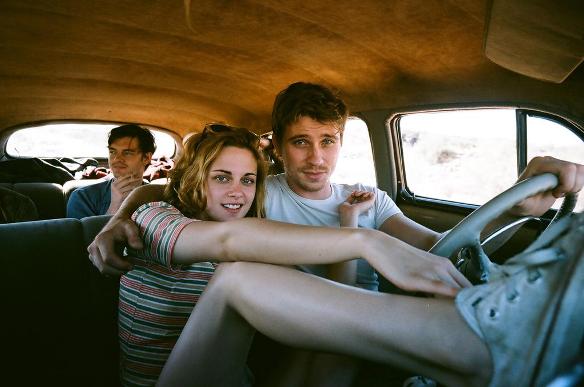On The Road, the cinematic adaptation of Jack Kerouac’s classic novel, is the most recent of the slew of supposedly “unfilmable” books that actually made it to the screen in recent months. Reasons differ in each case for the delay in transition of tantalising material from page to celluloid: Yann Martel’s Life of Pi was literally unfilmable for many years, the exquisite fantasy proving very difficult to translate on screen; the complex narrative line of David Mitchell’s Cloud Atlas proved, in the event, impermeable to the qualifications necessary to make it work as a film. As for Midnight’s Children? The less said about that film, the better.
But the challenges in adapting On the Road were, if I may venture an educated guess, more temporal in nature. If you’ve read the book, you would appreciate the muscularity with which it captures the abandon of a very particular age. The book still resonates, but more as a historical document rather than as the testament of our age. The drug taking, the sexual adventurism, the heedless abandon with which Kerouac, Neal Cassady, LuAnne Henderson and Allen Ginsberg – well, their literary proxies, Sal Paradise, Dean Moriarty, MaryLou and Carlo Marx – threw themselves at life might have presented as romantic then, but would more likely seem terminally irresponsible now. And cinema, even with the best intentions in the world, is reductive in nature: evoking the Beat generation on film today, sympathetically will always be a big ask.
But from a different perspective, there is a contemporary relevance: On The Road is also about the search for the meaning of masculinity. This was particularly pertinent in the post-war era within which the book is anchored, and is increasingly relevant today as traditional roles apportioned by gender are eroded – or made more equitable, at least – and as manhood searches for new meaning in a changed world.
1948, Queens. Sal (Sam Riley) is a young writer in search of his muse. His father is recently deceased, home life with his widowed mother is comfortable but uninspiring, and his New York milieu is has a dreary conventionality beneath a superficial veneer.
Enter Dean, from Denver, with his 16 year old wife MaryLou in tow. Abandoned by an itinerant father, Dean, played with perhaps a little too much intensity by Garrett Hedlund, treats life like a participatory sport. Life on the margins, one quickly gathers, is worse than no life at all. Stealing, drinking, whoring, loving, he throws himself at them all with a gusto that suggests that tomorrow doesn’t feature highly in his day-to-day calculations.
After a brief but eventful interlude in New York, Dean heads back to Denver with Carlo in tow; it doesn’t take long for Sal to succumb to his restless instinct, and he tracks west after them. It isn’t the meaning of life that he is looking for; it’s the experience of life that he wants, and experience is what one gets when one is around Dean.
There’s an argument that On The Road is one unbroken orgy of decadence, leavened by the admittedly spectacular vista of the great wide open, as Sal, and then Sal and Dean and MaryLou – an engaging turn by Kristen Stewart – criss-cross the country, from California to Denver back to New York, then North Carolina, Louisiana San Francisco…Along the way, Dean divorces MaryLou and marries Camille (Kirsten Dunst: without much material to work with, she is virtually invisible); but otherwise, it is very much business as usual, to the chagrin of both women. Sal is in love with the idea of Dean, perhaps even in love with Dean. MaryLou plays game, but only because it keeps her with Dean. It’s all terribly futile, even a little nihilistic.
However, there is an intriguing subtext worth teasing out. Salles is a thoughtful director, his films (take The Motorcycle Diaries, or Central Station) often carry a preoccupation with the notion – the fear, even – of absence and emptiness, how to fill this void. Sal and Dean need to create something out of nothing, they need to fill their lives with drama. The alternative, you see, will be unbearable. Literally so. It’s no mistake, I feel, that both young men lack a masculine role model to either measure themselves alongside or rebel against. It’s also no mistake that it falls to wives and lovers and mothers to clear up the detritus that they leave in their wake. Such is the way of the world.
On The Road is infused with a relentless, kinetic energy. But this exhausts after a while, a perpetual motion machine that lacks an outlet for the energy it generates. Still, this does give its more thoughtful interludes an added poignancy: a short sequence where Dean wanders the streets of Denver in search of his hobo dad, for instance; or when Sal, depleted after an ill fated adventure in Mexico, returns to the drudgery of his New York job, shifting cars in a parking lot. Not much is said, but the experiences are almost unbearably sad.
But these moments of quiescence are not enough in themselves to give the film the heart that it lacks. It seems that Salles might have been a little too respectful of the source material, a little to reluctant to reshape and reconfigure to his own liking. Shorn of a half hour or so, a slightly greater emphasis placed on what is happening around Sal and Dean rather than what is happening to them, and On The Road might have packed a more potent emotional punch. But as it is, it is neither one thing nor the other.
On The Road (USA, 2012, 124 min, English with Hebrew subtitles)
Directed by Walter Salles; Starring Sam Riley, Garrett Hedlund, Kristen Stewart and Kirsten Dunst






